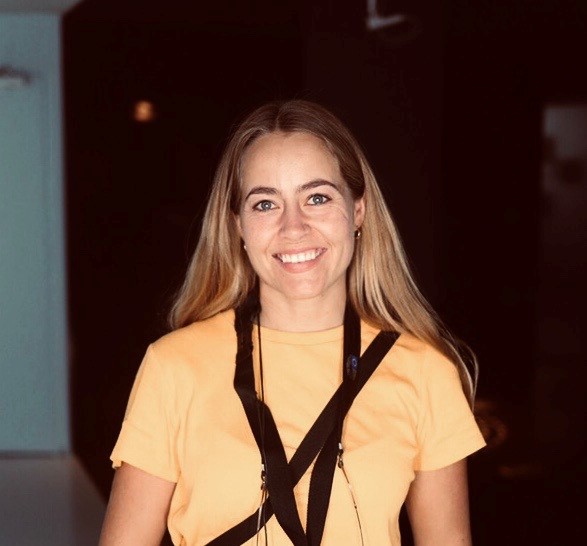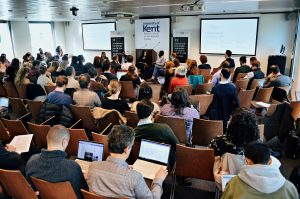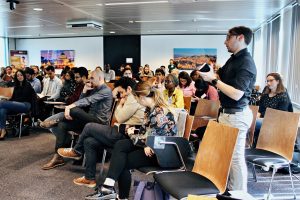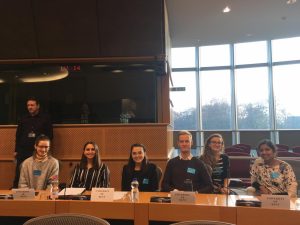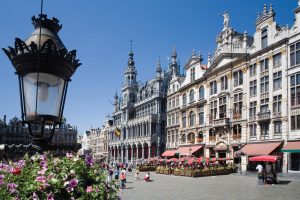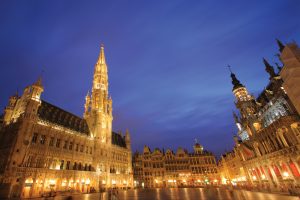Why did you choose to go to Brussels?
I chose Brussels because it is known as the capital of Europe, the centre of international relations. You can find the main international institutions like the EU, EFTA, European Commission and our old friend, Jens Stoltenberg in NATO. Furthermore, many think- tanks and NGOs. There is always something exciting going on, such as international conferences outside of school. My school likewise invite us to international lectures with speakers from all over the world. Brussels is a great city to start of your career. There are great opportunities to do internships part time with school, or after you finish.
Moreover, Brussels is a great city to shape and expand your network. You meet people from various cultures all over the world. My school represent students from 50 different countries . Brussels also offers opportunities to learn French and Flemish, as Belgium is divided between both.
How was the application procedure?
The application takes a while, especially because the school requires many documents. However, that’s not a reason to give up!
They accept a wide range of subjects for entry, but most common are political science, law, culture, history, and international development, in which the latter is my undergrad from Oslo Metropolitan University in Oslo, Norway. They require an average B grade from undergrad. I had to wait until June to submit my final grade because I had to await my thesis grade.
Furthermore, for the English requirements- BSIS requires all non-English speakers to reach a minimum standard of proficiency in written and spoken English. In my case, I have studied two years in the US, which was a sufficient proof of my proficiency. For most applicants they would need to take an English test; TOEFL or IELTS.
One recommendation letter is required. It is unusual to write recommendation letters in the Norwegian school; I asked my professor at Oslo Metropolitan University, but only received a two-sentence long recommendation letter. I therefore had to turn to my sources in the US from my exchange year. Professors in the US write recommendation letters on daily basis, which was very convenient for me. I received one recommendation letter from UC Berkeley and one from San Diego State University. I received letters BSIS could not possibly say no to!
I had to collect all my transcripts and diplomas from High School to University and write a motivation letter stating my motivation and why they should give me a chance to study at BSIS.
Can you say something about your studies and the teaching?
I am doing a full-time, one-year master’s in International Relations with a secondary specialisation in International Law. I started in September 2019 and following the plan, I will submit my dissertation at the end of July. You have to be structured and disciplined, as the study is designed for much self-study. I have three courses a semester, in which I have one hour of lecture and one hour of seminar. Additionally, all students have Foundations, Dissertation and Research (FDR) which is a course designed for writing our dissertation. During seminars, students most commonly have to present a certain topic assigned by the lecturer. Just last week I presented the WTO trade dispute between Norway and Canada against the EU on seal hunting.
The professors encourage students to take part in discussions in class. I really like it because it motivates students to study and participate if it develops into a discussion. Especially in my field, we constantly need to have a critical eye for the approach taken.
What is the biggest difference between studying in Norway and Belgium?
The biggest difference is the length of the study. In the Norwegian school system, Master programs are two years long with 120 ECTS (credits) earned. Moreover, my study here in Brussels is a one-year intensive study(with no break). The master is 90 ECTS (credits) It is also a possibility to take an extension of 1,5 year to earn 120 ECTS (credits). Another difference is that the whole degree is in English.
Moreover, if students are worried about the amount of credits, I am pretty sure that your employer won’t notice the difference.
BSIS offer excellent employability with many opportunities to study and work abroad. They provide a wide network for future occupations.
What is a normal day in Brussels?
I usually start my day at the gym. My classes are not until later in the day. I often bike to school as the roads are decently facilitated for bikes. I am at school for approximately 7 hours a day including lectures and seminar. After school I will either go to conferences, networking events or downtown to Grand Place with my friends. Important economic, social and political decisions are made every day; there is always something going on. Sometimes I study at night as well.
How is the student environment?
BSIS is a small campus in Brussels. The main campus is in Canterbury, but they additionally have campuses in Paris, Rome and Brussels. BSIS is a very international school. There are approximately 200 Master students and PHD- candidates at BSIS. The size of the school facilitates a close relationship with fellow students, administration and professors, and create a wonderful environment. You can truly work close with the professors that guide you in the direction you are aiming for.
I was elected as the Academic Officer in our student election to represent the students. In that way I also get to talk more to all the students and staff. I am the political representative to the academic and administrative staff of BSIS. I answer questions students might have and try to advise students in the best possible way to suit their career perspectives.
What do you do when you’re not in school?
I am the head of the Association of Norwegian Students Abroad in Belgium. Our job is to offer Norwegian students’ events with opportunities to get together and socialise. We are approximately 60 students in Belgium, not counting interns. However, we also include interns in our event as well. We arrange different events such as pub-crawl, dinner night, celebration of our constitution day, which is the 17th of May, welcome gatherings for new students, NATO visit and such. This is a great way to let Norwegian students know that they are not alone, even though they might feel that way. The association offers many resources such as access to a psychologist, webinars regarding CV, cover letter, insurance etc.
I am eager to attend conferences and networking events. It is very convenient to have the European Parliament as my next-door neighbour. I recently went to the EFTA introductory seminar on the EEA. A seminar concerning the role of EFTA states within the EEA, and how EU law becomes EEA law. It came with the chance of networking with other fellow Norwegians in Brussels.
From the cultural perspective, Brussels offers plenty of museums to visit. I personally like the Magritte museum.
As the location of Belgium is in the heart of Europe, it is very easy to get around. There are trains in every direction. I have been to Paris and Amsterdam a couple of times, as well as the other wonderful cities in Belgium such as Bruges, Ghent, Leuven and Antwerp. It’s perfect to take the train to the coast during summer.
What are the prices and rents compared to Norway?
The rent in Brussels it cheaper compared to Norway. It varies widely, but you can find a nice place to live for around 400 euros, (with roommates). If you want to live by yourself, the price would be approximately 600-1000 euros.
Going grocery shopping is also a bit cheaper than Norway. How can it not be?
I likewise enjoy a better meal in a restaurant more frequently than I would do in Norway. The main difference is(looking from a student perspective) is that you can only get a student discount until you are 25 here in Brussels. That means I have to buy a metro card with adult price. In Norway you can enjoy student prices until you are 30 years old!
Is there something negative or challenging with studying in Belgium?
I’d probably say the language. I have no pre-knowledge of French, which would have been useful. Especially when I go grocery shopping. The employees there don’t really make an effort to speak English. It would also be an advantage when I go to conferences as well, as many of them also are presented in French. However, this is not a big issue. There are many possibilities to sign up for a language course in the official languages French and Dutch, as well as other international languages.
Was there something you would have liked to have known before you left?
No. I believe the best recipe for development is to explore and challenge yourself by your own.
Would you recommend other people to study in Brussels?
Definitely!! Perhaps take a French course beforehand. In that way you will be more prepared for the life outside school. If you study in Brussels, you should have a strong interest for international relations and politics, as there are so many opportunities to start of your career.
Article translated from Norwegian, thanks to Studenttorget.no Journalist Kjetil Taskdal. https://studenttorget.no/index.php?show=4827&expand=3796%2C3929%2C3930%2C4827&artikkelid=20069&fbclid=IwAR28Q2A5hyWIkdcRcdpVzLe-JcANa0r6smG1zO1bhrwuekWElbNOMERbJbY

